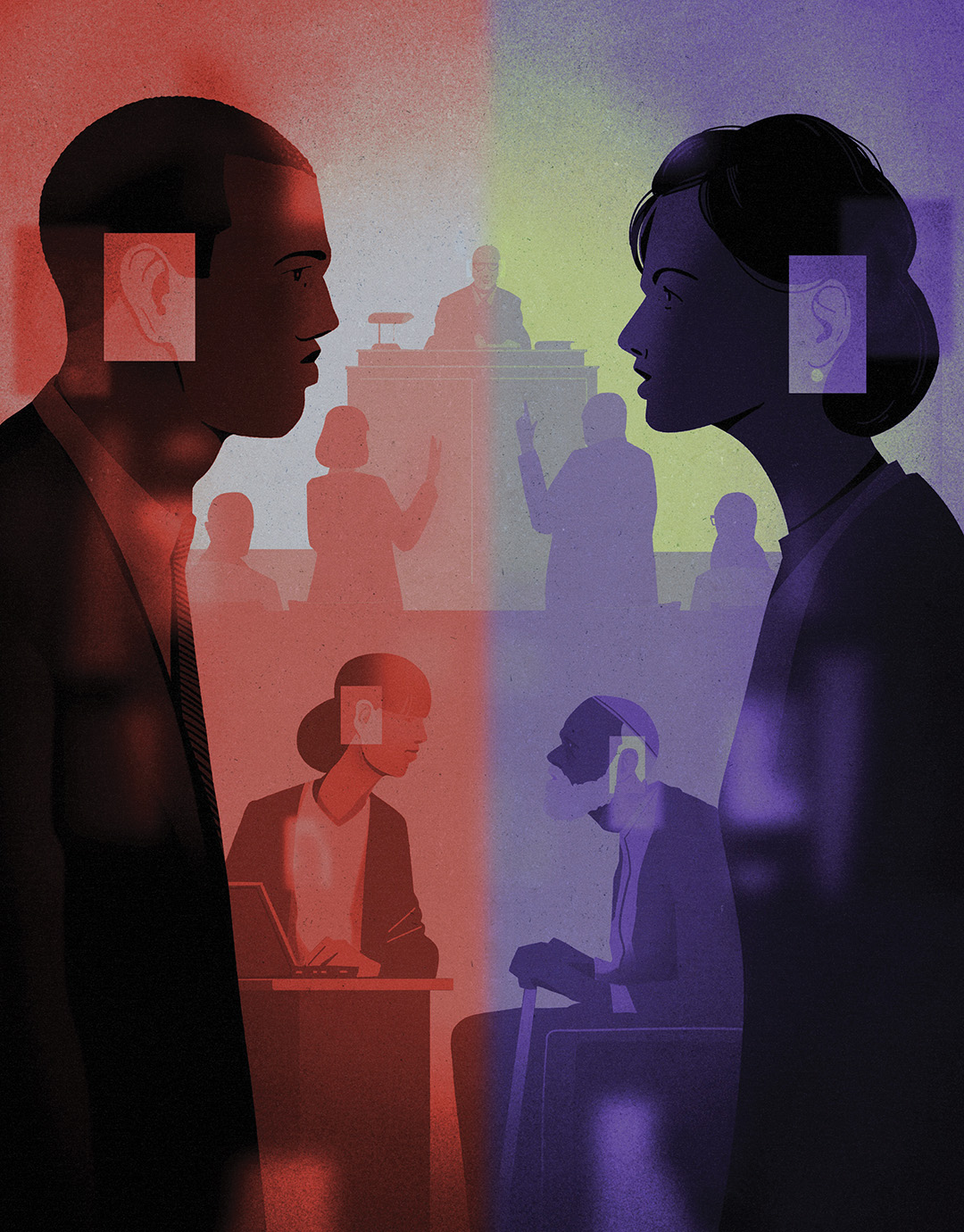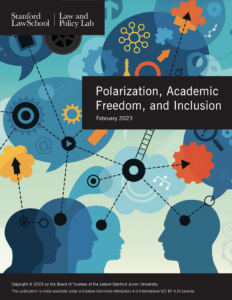Constructive Conflict
SLS Professors Address Polarization and Promote Open Discourse
When David Mollenkamp, JD ’25 (BA ’19), started at Stanford Law School last year, he felt like something was missing.
“I couldn’t find sufficient opportunities on campus to engage in friendly debate on matters of ideology and politics,” says Mollenkamp, who describes himself as conservative leaning. “I noticed this reluctance to engage in politically sensitive conversations not just in other people but also in myself. There are all these groups at the law school organized by interest and political affiliation, but people don’t talk across these groups. I felt that was an important part of law school life that was missing.”
That is, he says, “until I found ePluribus.”

ePluribus is one of several initiatives that SLS faculty members have launched in recent years to counter the pervasive trends of polarization and self-censorship. Norman Spaulding, JD ’97, the Nelson Bowman Sweitzer and Marie B. Sweitzer Professor of Law, and Paul Brest, professor emeritus and former SLS dean, piloted the group in 2021 to foster thoughtful engagement across political and other differences and to counter the effects of polarization on open dialogue in the legal profession.
ePluribus acts as a counterweight to reams of research by numerous organizations, including the Pew Research Center, showing Americans are increasingly divided not only across the political spectrum but on questions involving race, religion, reproductive rights, sexual identity, and more. The Pew study found that ideological commitment is so intense that people can’t even agree on the basic facts relevant to tackling social problems. As a result, from Congress to college campuses, many people who have different values, identities, and beliefs are avoiding conversations about divisive topics, seeking refuge in echo chambers on “their side.”
In ePluribus, students commit to inviting someone to join the group with whom they disagree on something fundamental and want to engage in further dialogue. A centerpiece each quarter is small discussion groups in which students read and discuss research on polarizing topics over meals with Spaulding and Brest. Prison abolition, reproductive rights after Dobbs, and cancel culture are recent examples.
This year, Diego Zambrano, associate professor of law, joined as an additional faculty sponsor of ePluribus and, along with Spaulding and Brest, is working to expand the organization to meet increased student demand and to provide additional programming such as speaker events to host experts in conflict resolution and others with distinguished professional careers navigating difference.
“ePluribus is built on the idea that students become better lawyers and leaders through engagement with difference,” says Brest.
Discourse, Debates, and Dinner
Academic Freedom, Free Expression, Diversity, and Inclusion is a 1L discussion group that is meeting during the autumn 2023 quarter over four dinners at the Brest home. The seminar was designed to “test the hypothesis” that free expression, diversity, and inclusion can be served equally without compromising any of them.
The discussion seminar is part of an SLS initiative for all first-year law students that encourages exploration of the real-world implications of law in groups of 8 to 12 peers led by faculty. The seminars are designed to support conversations across differences by promoting reflection on the legal profession, on professional identity, and on provocative topics in law.
One of the participants in Brest’s seminar is libertarian Desmond Mantle, JD ’26, who says he turned down other top-ranked law schools in favor of SLS in significant part because of the commitment to free speech and inclusion outlined in the so-called “Martinez Memo,” which former dean Jenny Martinez, now Stanford University provost, penned in March 2023. “I really loved our first small group discussion at Professor Brest’s home, and it made good on what I expected from Stanford Law School, which was that the administration would have my back and that nuanced political views could be voiced and defended. Because my political views are somewhat unique—I’m not a liberal or a conservative—I greatly value the freedom to inquire and see it as the essence of what a university should be.”
A Report Offers Remedies

Spaulding and Brest have also worked collaboratively with a diverse group of students from across the university in a Law and Policy Lab held during the last academic year to develop guidance to improve the climate across the university. Their results were published in a report “Polarization, Academic Freedom, and Inclusion.”
“The practice of law demands the ability to engage in difficult conversations with people who have sharply divergent needs, beliefs, and identities,” Spaulding says. “These skills do not necessarily come naturally or easily but are critical. They matter not only to the practice of law but to a functioning democracy.”
The report recommends that universities prioritize the teaching of basic skills to foster open, inclusive campus discourse. As in the ePluribus workshops, some of the core recommended skills include techniques for heightening awareness of cognitive biases without shaming (encouraging people to question their own stereotypes and foster a critical perspective on how cognitive biases distort communication), active listening (engaging in techniques that help a speaker feel genuinely heard and promote mutual understanding of the sources of disagreement), and emotional intelligence (cultivating both analytic rigor and recognition of the powerful feelings disagreement can bring to the surface).
At the heart of all their work is the idea that academic freedom, free speech, critical inquiry, diversity, and inclusion are not competing principles, but are in fact all integral to a healthy, pluralistic society and to learning in higher education.
“Deep learning happens when discourse is open and inclusive—when we are engaged, when we know we will be heard, and when we actively seek to understand the beliefs of others,” says Spaulding. “Learning doesn’t happen when we are focused on affirmation of what we already believe and condemnation or retreat to silence if that affirmation isn’t forthcoming.”
Bojan Srbinovski, JD ’24 (BA ’16), participated in last year’s policy practicum that produced the report to the Office of the President. For him, the practicum confirmed that there is no easy fix to the issues of academic polarization and calcification. “At the same time,” he says, “thinking about ways to lower the temperature continues to be a worthwhile pursuit. It is never easy to have tough conversations with people you disagree with,” he says, “but the alternative—not having them—can cause more harm in the long run.” SL
